I found this in Eclectic Magazine Foreign Literature By John Holmes Agnew, Walter Hilliard Bidwell. I imagine it is a well-known song in Euskadi, but I hadn’t come across it before. This is the Basque perspective of the events portrayed in the Song of Roland. I don’t know how old this is, but I thought it was interesting.
The Song of Attabiscar
A cry is heard
In the Basque mountains.
Every etcheco-javna [master of a house], standing before his door,
Listens and cries, Who is there, and what seek they?
The hound which was sleeping at his master’s feet,
Rises; and his deep baying resounds through Attabiscar.
There is a noise on the hill of Ibaneta;
It echoes, as it draws near, between the rocks.
It is the dull murmur of a coming host.
Our men have answered it on the mountain-tops,
The warning of their horns has been heard,
And the etcheco-jauna sharpens his weapons for the fight.
They come, they come! What a hedge of spears!
Banners of all hues float in the midst,
And a dazzling light flashes from their arms.
How many are they? Comrade, count them well.
One, two, three, four, five, six, seven, eight, nine, ten, eleven, twelve,
Thirteen, fourteen, fifteen, sixteen, seventeen, eighteen, nineteen, twenty.
Twenty! aye, and thousands more.
It would be a waste of time to count them.
Let hand join with hand, to uproot the rocks,
And hurl them down from the mountain-summits
On their heads,
Till they lie crushed and dead.
What would they with our hills, these men of the North?
Wherefore have they come to vex our peace?
When God made these mountains, it was that men should not pass them.
But the rocks fall, and smite down their hosts.
The blood flows in streams, the mangled limbs quiver.
Ha! for the crushing of bones! Ha! for the sea of blood!
Fly, ye who have strength; fly, ye who have horses!
Fly, King Carloman, with thy sable plumes and scarlet mantle?
Roland the Brave, thy loved nephew, lies dead;
Thy bravery hath been of no avail for him.
Now, ye Basques, leave these rocks,
And shoot down your enemies in their flight with your arrows.
They fly, they fly! Where is the hedge of spears?
Where are the banners of all hues that floated above them?
No dazzling light flashes from their blood- soiled armor.
How many are they? Comrade, count them with care.
Twenty, nineteen, eighteen, seventeen, sixteen, fifteen, fourteen, thirteen,
Twelve, eleven, ten, nine, eight, seven, six, five, four, three, two, one.
One! there is not even one remaining.
All is over. Etcheco-jauna, thou mayest go back with thy hound,
Embrace thy wife and thy children,
Furbish thy weapons, hang them up with the horn, and then lie down to sleep beneath them.
The eagles will come in the night to feed on mangled flesh,
And the bones shall bleach on the ground for evermore.
Share this / Partekatu hau:
Like this:
Like Loading...
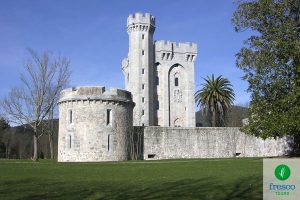 Fresco Tours, based in Spain, is a tour company that offers tours of Spain. One of their tours, Basque in the Glory Tour, is centered on that part of the Camino de Santiago that passes through the Basque Country. Going from Hondarribia, through San Sebastian, Orio, Zumaia, and Deba to end at Bilbao and the Guggenheim, the tour focuses on the lesser known sites along the Camino.
Fresco Tours, based in Spain, is a tour company that offers tours of Spain. One of their tours, Basque in the Glory Tour, is centered on that part of the Camino de Santiago that passes through the Basque Country. Going from Hondarribia, through San Sebastian, Orio, Zumaia, and Deba to end at Bilbao and the Guggenheim, the tour focuses on the lesser known sites along the Camino.

 Andy Franco recently learned of his Basque roots and, since then, he has really immersed himself into all things Basque he could. A blacksmith, who owns Calico Forge in Nampa, Idaho, he was an integral part of the recent exhibit at the Basque Museum in Boise on Basque whaling. Andy forged the harpoons and other implements, including the lamps, that are part of the display. He has also contributed to local fundraisers, making some beautiful lauburus and other Basque-related items, some of which are also for sale at the gift shop at the Basque Museum.
Andy Franco recently learned of his Basque roots and, since then, he has really immersed himself into all things Basque he could. A blacksmith, who owns Calico Forge in Nampa, Idaho, he was an integral part of the recent exhibit at the Basque Museum in Boise on Basque whaling. Andy forged the harpoons and other implements, including the lamps, that are part of the display. He has also contributed to local fundraisers, making some beautiful lauburus and other Basque-related items, some of which are also for sale at the gift shop at the Basque Museum.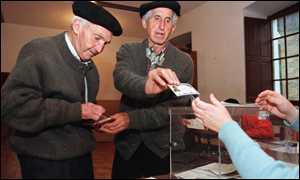 First, on Sunday, March 1, elections where held in the Basque Country (as well as other parts of Spain) for the Basque Parliament, the body that governs in the Basque Autonomous Community (BAC) comprised of Bizkaia, Gipuzkoa, and Araba. Since the formation of the BAC shortly after Franco’s death, the Basque Nationalist Party (PNV-EAJ) has held power in the Parliament. On Sunday, while they still won more seats than any other party, they didn’t capture a majority. What’s more, a combination of parties that are not Basque nationalist in outlook, including the PSE-EE and PP, do hold a majority, and could elect the first non-nationalist, non-PNV-EAJ lehendakari (president) of the BAC since it’s formation. What this will mean for a number of Basque-related issues is unclear, including language policy, the proposed referendum for self-determination, and so forth. What is clear is that things will be different in the BAC in the future. There is a lot of talk about what this means for the future of the BAC; see
First, on Sunday, March 1, elections where held in the Basque Country (as well as other parts of Spain) for the Basque Parliament, the body that governs in the Basque Autonomous Community (BAC) comprised of Bizkaia, Gipuzkoa, and Araba. Since the formation of the BAC shortly after Franco’s death, the Basque Nationalist Party (PNV-EAJ) has held power in the Parliament. On Sunday, while they still won more seats than any other party, they didn’t capture a majority. What’s more, a combination of parties that are not Basque nationalist in outlook, including the PSE-EE and PP, do hold a majority, and could elect the first non-nationalist, non-PNV-EAJ lehendakari (president) of the BAC since it’s formation. What this will mean for a number of Basque-related issues is unclear, including language policy, the proposed referendum for self-determination, and so forth. What is clear is that things will be different in the BAC in the future. There is a lot of talk about what this means for the future of the BAC; see 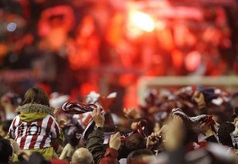 Second,
Second,  The other day, my wife and I were in Trader Joe’s and saw this display. As a good ol’ Vasco who loves chorizo (see my previous post), it just felt wrong to see soy chorizo.
The other day, my wife and I were in Trader Joe’s and saw this display. As a good ol’ Vasco who loves chorizo (see my previous post), it just felt wrong to see soy chorizo.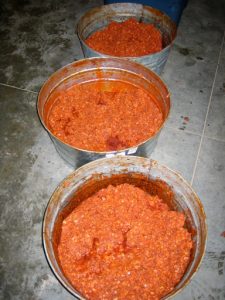
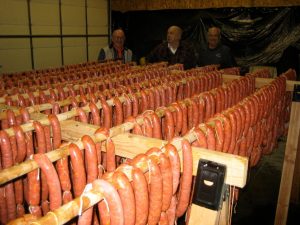
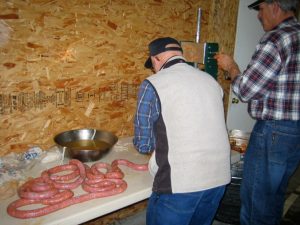
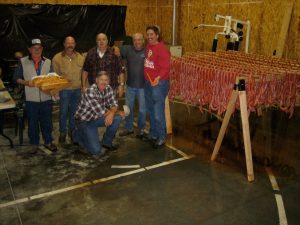
 This morning (11AM Bilbao time), ETA set off a car bomb at the headquarters of EiTB, the Basque radio/television company. It appears that no one was hurt, as there was a warning. More information can be found on
This morning (11AM Bilbao time), ETA set off a car bomb at the headquarters of EiTB, the Basque radio/television company. It appears that no one was hurt, as there was a warning. More information can be found on 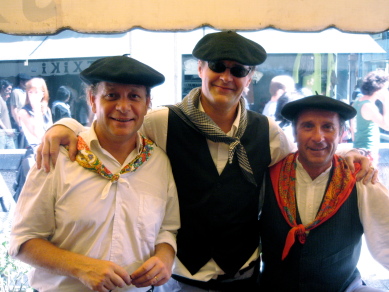 Some of you may recognize the name Mikel Morris. He has written the definitive Basque-English dictionary, the Morris Student Plus. Mikel, born in the United States, has lived in the Basque Country since 1978. As part of his efforts to live in Euskadi, he created the
Some of you may recognize the name Mikel Morris. He has written the definitive Basque-English dictionary, the Morris Student Plus. Mikel, born in the United States, has lived in the Basque Country since 1978. As part of his efforts to live in Euskadi, he created the  It is nearly time for the next edition of the Buber Sarriak, honoring the best Basque related websites. This year, the ceremonies will be held in the Guggenheim Museum in Bilbao! Pretty exciting! To learn more, including what sites are up for the honors, visit
It is nearly time for the next edition of the Buber Sarriak, honoring the best Basque related websites. This year, the ceremonies will be held in the Guggenheim Museum in Bilbao! Pretty exciting! To learn more, including what sites are up for the honors, visit